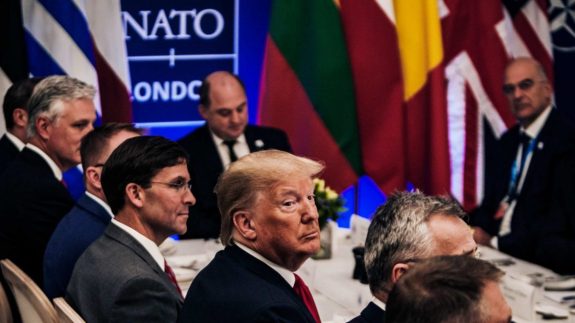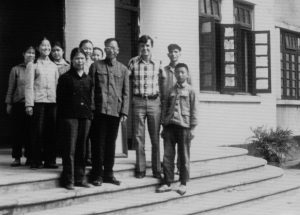Coping with Combat Readiness Strategies in US Global Alliance Systems

Denis Bright invites discussion on the state of Australian sovereignty in an age of combat readiness since the ascendency of President George W. Bush and his successors. What is left of the consultative processes which were once part of the ANZUS Treaty of 1951-52?
Back in 1952 when the Australia US Alliances commenced operations as a trilateral strategic alliance, political governance existed to provide a veneer of protection to national sovereignty. This veneer was chipped when the US Secretary of State George Shultz and Australian Foreign Minister Bill Hayden negotiated the amended Alliance protocols in 1984. The Australia–US Ministerial Consultations (AUSMIN) still gave some illusions about the significance of ministerial consultations.
The latest AUSMIN consultation meeting in Sydney on 5 June 2017 involved Minister for Foreign Affairs, Julie Bishop, Minister for Defence, Senator Marise Payne as well as U.S. Secretary of State, Rex W. Tillerson, Secretary of Defence, James Mattis and their specialist staff members.
In this Trump era, the Alliance is steadily evolving into a political coalition of numerous willing nations without codified treaty arrangements. The local participants include the Philippines, Indonesia and the near Pacific Neighbours like PNG (AUSMIN Joint Statement 2017).
From Genuine Consultative Processes to Combat Readiness
Within this new tangle of global strategic involvement, there is a new ascendency of U.S-Australia Force Posture Initiatives. There are similar arrangements with formal NATO alliance partners and friendly states like India, Singapore, South Korea, Taiwan. The goal of collective combat readiness predates the election of President Trump. It was noted in the Defence Posture Statement by Ash Carter during the final year of the Obama Administration.
This state of permanent mobilisation contrasts with earlier consultative processes and respect for the role of the UN Charter and the UN Security Council in the peaceful resolution of conflicts. While the Trump Administration uses the Security Council to justify NATO defence responses, President Trump has foreshadowed big cuts in US financial contributions to UN Activities (ABC News Online 25 May 2017).
New roles for the Joint Defence Base at Pine Gap are an additional factor in the erosion of Australian sovereignty. Timely alerts have come from the US Nautilus Institute, documents from Edward Snowden’s network and academic specialists (Nautilus Institute Online). Australia is so embedded in US Global Alliance Systems that there is little time for real consultations. High technology weapons’ systems are standardized and brand compatible for joint operation at a moment’s notice.
The Chipped Veneer of Public Accountability
A chipped veneer of accountability perhaps remains through the Joint Parliamentary Committee on Intelligence and Defence. This Committee was formed as a recommendation from the Hope Royal Commission appointed by the Whitlam Government. Full implementation of the recommendations had to await the election of the Hawke-Keating Governments (1983-96).
Since 2013, the federal LNP has scaled down the release of details from this Joint Committee on Intelligence and Defence. The federal parliamentary web site has some sketchy details in the latest Annual Report for 2015-16. Access is also available to reports from previous parliaments.
Blank minutes of the Joint Parliamentary Committee on Intelligence and Security were once issued with a list of the participants. The venues of meetings including at least one inspection tour of the Joint Defence Base at Pine Gap in Central Australia.
After the debacle of commitment to the war in Iraq on doctored intelligence evidence in 2003, the British government is more open about the activities of its Joint Committee on National Security Strategy. Don’t expect to find out too much about communication bases such as RAF Menwith Hill in Yorkshire or General Government Communication Headquarters at Cheltenham. Just wait for staged media briefings. For Britain, this includes the ongoing shame of arms sales to Saudi Arabia for use in the civil war in Yemen.
Cautions against this style of commitment do not gain much traction in mainstream reporting which encourages the rush to combat readiness and strategic involvement which is so far limited to two RAAF Orian surveillance aircraft and a hint of future involvement in the training of counter-insurgency forces in the Philippines.
Associate Professor of South-East Asian politics at the Australian National University, Greg Fealy, warned nations like Australia should tread carefully when deciding what assistance they give (ABC News Online 24 August 2017).
As with British support for Saudi counter-insurgency operations in Yemen, there are blanks in the history of the conflict and human rights abuses associated with state terrorism and extra-judicial killing by existing and previous Filipino governments.
Human Rights Watch covers many issues which are not even mentioned by federal LNP Ministers responsible for strategic commitment to Mindanao. Such human rights abuses and the overall income divide in the Philippines are excused by the glowing reports on the Filipino economy from the World Bank Online.
Another strategic rationale for involvement with the Philippines is its command of lesser used seaways between the Pacific and Indian Oceans through the Indonesian Archipelago to Australia’s Near North (Sciencing Online 2017).

Places of such magic beauty should invite the formation of nuclear weapon-free zones with the protection of the UN Charter as considered in the original ANZUS Treaty of 1952.
Commercial shipping is destined to use these waterways. Submarine flotillas equipped with weapons of mass destruction using these waterways can be supported by military air bases in the Philippines.
Almost Forgotten Diplomatic Ways and Means Towards Sustainable Peace
The Security Council is unanimous in its condemnation of every missile launch from North Korea but silent on other aberrant tests by Israel, Pakistan and India which are also outside the NPT regime. During the US Presidential election campaign, The Washington Post reported on the merits of sharing nuclear weapons technology with friendly US Allies:
According to Donald Trump, the United States should not try so hard to stop nuclear proliferation. On Sunday night, during a Republican town hall hosted by CNN’s Anderson Cooper, Trump declared that proliferation is “going to happen anyway.” And just a week earlier, Trump told the New York Times, “If Japan had that nuclear threat, I’m not sure that would be a bad thing for us.” Nor would it be so bad, he’s said, if South Korea and Saudi Arabia had nuclear weapons, too. We can break down Trump’s assertions into two ideas: Proliferation is inevitable, and it is good for the United States — at least when its allies are the ones going nuclear.
If sabre-rattling by President Trump has not deterred the resolve of North Korea, responsible middle powers like Australia might consider supporting calls for last minute diplomatic restraints on North Korea. The current strategic war games in the Korean Peninsula are potentially inflammatory. According to CNBC, larger war games are planned for spring 2018 if these current exercises do not provoke accidental military engagements (CNBC Online 20 August 2017).
If threatening North Korea does not really work, it might be time to try some alternative strategies. For President Trump, the logical outcome of the current impasse with North Korea is the emergence of nuclear weapons states in Japan, South Korea and Taiwan.
Ironically, it was fears of the remilitarization of Japan which ensured bipartisan support for the ANZUS Treaty in 1951. Now a remilitarized Japan armed with nuclear weapons is being considered by President Trump and senior members of Japan’s far-right LDP government.
Even high officials are beginning to openly talk about a possible nuclear option. Politicians close to Abe, including Deputy Prime Minister Taro Aso, who also serves as finance minister; Yusuke Yokobatake, who heads the Cabinet Legislation Bureau; Tomomi Inada, who is the defense minister and a possible candidate for future prime minister; and even the ever-skilful diplomat Foreign Minister Fumio Kishida — have made a number of claims over the past year or so that acquiring nuclear weapons is not actually against the Constitution, and is a possible option for the government to pursue (The Diplomat Online 21 April 2017).
Asian countries have lived through the extreme strategic challenge posed by the emergence of atmospheric nuclear tests in China in 1964 and the subsequent nuclear missile trials. Elements of the current problems with North Korea have created almost forgotten theatrics in the past. Tensions between the Soviet Union and China were just as extreme in 1969. Deaths occurred over skirmishes between border guards from the Soviet Union and China. The National Interest Online (2 July 2017) has reviewed this almost forgotten strategic problem.
If the Soviet Union had chosen war, it would have had two choices. The first choice would have been a conventional mechanized attack into Manchuria, where much of China’s industry was located, coupled with a limited “counterforce” nuclear strike against Chinese nuclear forces and nuclear-research facilities. A Soviet attack into Manchuria in 1969 would have resembled the invasion of the same region in 1945 against Japanese forces, and would likely have followed the same invasion routes. Such an attack would likely have been more modest in scope and focused—the 1945 attack had been carried out by 1.5 million troops by a fully mobilized Soviet Union. An attack in 1969 would likely have been carried out by half as many troops but with more firepower, supported by modern armour, artillery, tactical air forces and possibly even tactical nuclear weapons.
A second option would have been the same nuclear strikes against China’s new nuclear-weapons program without an accompanying invasion of Manchuria. China had tested its first nuclear weapon in 1964 and conducted its first underground nuclear test in 1969. It is not clear whether any of China’s nuclear weapons would have been useable in a war with the Soviet Union, but Moscow could not have afforded to find out the hard way. One major question is whether the Soviet Union would have coupled an attack on China’s nuclear weapons with a thermonuclear attack on Beijing and China’s leadership. An attack on Beijing by just one Soviet SS-8 intercontinental ballistic missile, armed with a 2.3-megaton thermonuclear warhead, would have obliterated the city and killed more than half of the city’s 7.6 million residents.
Australia’s federal LNP was kept out of the loop US initiatives to normalise relations with China. President Nixon with the active encouragement of Secretary of State Henry Kissinger decided to engage with China rather than remain neutral in any Sino-Soviet War. This occurred at a time when the Soviet Union was supporting North Vietnam in its long struggle against US troop deployments to South Vietnam.
The peaceful rise of China out of the internal chaos of the Cultural Revolution is largely the product of canny US diplomacy. The change commenced with the visit of US envoys to China. Colourful public episodes followed including Ping Pong Diplomacy, cultural exchanges, travel opportunities and finally the visit of President Nixon and Henry Kissinger to China between 21-28 February 1972.
 One of the proudest moments in Australian political history was Labor’s support for the peaceful re-emergence of China and the transfer of China’s seat at the Security Council from Taiwan to China. The groundwork for this transition was achieved while Gough Whitlam was still Opposition Leader in mid-1971.
One of the proudest moments in Australian political history was Labor’s support for the peaceful re-emergence of China and the transfer of China’s seat at the Security Council from Taiwan to China. The groundwork for this transition was achieved while Gough Whitlam was still Opposition Leader in mid-1971.
Prime Minister Whitlam returned to China in 1973 as the leader of a vibrant middle-power which had established diplomatic relations with both China and North Korea.
The visit of Gough Whitlam and the Labor Party Delegation to China in 1971 predated the arrival of US Secretary of State Henry Kissinger on his secret overtures to Premier Zhou Enlai by a matter of days.
Despite its loyalty to the US Alliance, the federal LNP had been kept out of the diplomatic loop on this vital issue and had foolishly dared to attack the Whitlamesque initiatives.
President Nixon’s delegation to China included ongoing liaison with Premier Zhou Enlai and a formal meeting with Chairman Mao Zedong. This was the week that changed the world for the better. It is time for another week like this in relation to the current challenges posed by North Korea.
Whitlam’s overtures to China involved responsible risk taking on a scale that would not be undertaken by the current generation of centre-left leaders.
On this Eve of Destruction over the absence of a permanent peace settlement of the Korean war, it is time for leaders with a vibrant Napoleonic style to put their hands up for new overtures to Pyongyang.

Crossing the Ideological Divide during the Australian summer holidays of 1974-75: School Pics are from Middle School No. 10, Guangzhou.
UN Secretary-General Antonio Gutierres of Portugal, President Moon Jau-in of South Korea and President Macron of France all have the right theatrics to try to consider crossing the 38th Parallel on a Joint Mission for Peace.
Progressive strategists need to at least return to the more visionary spirit of 1952 to look for Security Council Protection for nuclear-free zones with essential surveillance from an internationalized Pine Gap Joint Communication Base under Security-Council. This Base can monitor strategic military threats and potential regional terrorist challenges in a more accountable manner that goes beyond balance of terror games.
Australians should have no confidence in the diplomatic agenda of the federal LNP. Stirring up fears in the electorate can only assist in the re-election of the federal LNP in an opportunist early election if the strategic situation on the Korean Peninsula deteriorates. Holding out until 2019 for the next general election involves risky negatives such as a likely last-minute détente in Korea, unfavourable electoral redistributions ahead and the impact of a slowing global economy on living standards in Australia and political stability worldwide.
 Denis Bright is a registered teacher and a member of the Media, Entertainment and Arts Alliance (MEAA). Denis has recent postgraduate qualifications in journalism, public policy and international relations. He is interested in promoting discussion to evaluate pragmatic public policies that are compatible with contemporary globalization.
Denis Bright is a registered teacher and a member of the Media, Entertainment and Arts Alliance (MEAA). Denis has recent postgraduate qualifications in journalism, public policy and international relations. He is interested in promoting discussion to evaluate pragmatic public policies that are compatible with contemporary globalization.
Like what we do at The AIMN?
You’ll like it even more knowing that your donation will help us to keep up the good fight.
Chuck in a few bucks and see just how far it goes!
Your contribution to help with the running costs of this site will be gratefully accepted.
You can donate through PayPal or credit card via the button below, or donate via bank transfer: BSB: 062500; A/c no: 10495969










19 comments
Login here Register here-
David Bruce -
kasch2014 -
Patrick -
Paix -
Lalnama -
Tessa -
James -
Maria Heenan -
Patrick -
Ali K -
Roswell -
Sarah Samuel -
John -
Patrick -
Rubio@Coast -
Stella -
Ali K -
Paul -
Tristan Ewins
Return to home pageExcellent Article Denis. Australia is one of the 5 Eyes + 1 (Eyes Only – security level), centered on the GCHQ in UK. They run Echelon and Pine Gap provides an essential link in this monitoring program. Seems UK is still pulling the strings?
I was hoping you would address the issue of where does North Korea get its plutonium? The fact that the warheads used by the North Koreans are 2-3Kgs, might implicate the Israelis as suppliers?
With the US pivot to the Asia Pacific region, I was expecting to read about oil reserves in the region. So it was interesting to read in the Fijian Times yesterday that US$20 million is needed for in depth exploration to determine the true oil potential in Fiji! Exploration licences have already been given for the seismic surveys and drilling programs for the reefs around Fiji! With the potential of producing 1 billion barrels of oil, the money gods will no doubt be generous…
An analysis of the mindset of the terminally insane?
Give peace a change in the spirit of Gough Whitlam as Denis’ article has suggested!
Well researched article . Always room for diplomatic communication rather than aggression and war mongering.
Thank you for a well researched article, we live in times of the 24 hour news cycle & everyone has an opinion whether it is based on fact or not.
Let’s hope common sense prevails & peace ensues for all of us
People feel vulnerable with no sense of control & talk of war , or the threat of it does not help humanity co exist peacefully together
Let’s challenge the politics of fear as Denis’ article demands. Few Australians respect a Trump’s style of diplomacy.
Operation of Pine Gap needs to be transferred to the UN international atomic energy commission.
I would like to think that many people in the Australian Electorate might listen with respect to any Australian politician that spoke in favour of a Mission of Peace to North Korea.
Thanks Maria. Ironically, it was the USA that choose peace over war between Russia and China. There is a way out of war for President Trump and Bill Shorten in selecting envoys for peace in North Korea. Now is the time while summer still lingers in Pyongyang.
Just brilliant, as always. A very insightful take on a complex situation
Well researched and well written, Denis.
This was such an interesting read and very well thought out. When we look back at the past, it often serves to demonstrate the more questionable decisions being made in the present. The aggressive overtures of Trump’s administration only add fuel to the flames; diplomacy focused on peaceful resolution would be far more preferable.
A particularly topical article in current times – hopefully a peaceful resolution can be reached.
Time to lobby our federal MPs and Senators on both sides. The LNP has everyone scared about North Korea and might try to use it as a snap election issue as with the Petrov Affair in 1954
Us surfers at Box Head can emphasise with North Korea without supporting its nuclear tests. How would be feel if US planes and submarines stalked our borders with weapons of mass destruction every day of the year and every night. Do check out the North Korean surfing videos on You Tube!
Denis, thanks for a great article on a complex issue facing Australia and the region. Let’s hope common sense prevails and everything can be resolved peacefully and diplomatically.
Even more on point on a second reading.
Thanks for the great article Denis!
Peace is the only option. The alternative is devestating for all nations, humanity and the environment.
What Denis suggests is true ; a war on the Korean peninsula would be terrible ; Trump’s sabre-rattling only makes things worse ; And Australia should be meaningfully consulted on foreign policy by the US ; the US cannot and should not take it for granted that we will follow them into any (and every) war… Public guarantees to the NK regime on its survival on condition of the dismantling of its nuclear weapons program – must be tried first. Though guarantees were given to Gaddafi as well ; and when people break their word there is a loss of trust on all sides. It (NK government) is an appalling regime by any reckoning. But Seoul would be devastated by NK massed artillery in minutes in the case of war. And NK citizens are human beings – who would die in their hundreds of thousands – if not millions. Also Trump could use trade to gain leverage with China – and encourage China to put further pressure on NK. China lost over 1 million soldiers defending NK in the Korean War as well. A reason for them to want to see the regime reform rather than collapse in fire and/or chaos. Arguably there should be a vote of parliament in the case of any war as well ; it should not just be left to the Executive arm of government.